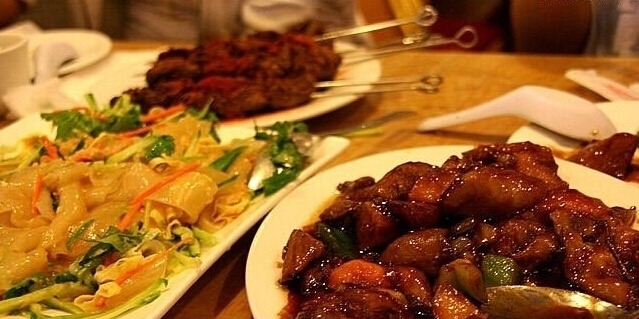(单词翻译:单击)
If there's a single identifiable moment when Jewish Christmas—the annual American tradition where Jews overindulge on Chinese food on December 25—transitioned from kitsch into codified custom, it was during Supreme Court Justice Elena Kagan's 2010 confirmation hearing.
如果有什么标志性的时刻来表明犹太人的圣诞节——这是一种年度性的美国传统,美国犹太人会在12月25号这天大吃特吃中国食物——从低级趣味转变成一个既定的传统的话,那这个时刻就非大法官艾蕾娜·卡根2010年的一次审议听证会莫属了。

During an otherwise tense series of exchanges, Senator Lindsey Graham paused to ask Kagan where she had spent theprevious Christmas. To great laughter, she replied: "You know, like allJews, I was probably at a Chinese restaurant."
在这次看似紧张的听证会上,参议员Lindsey Graham询问卡根她是怎么庆祝前一年的圣诞节的。她的回答是:“你知道,像所有犹太人一样,我可能在一家中国餐馆里吃中餐。”她的回答引起了人们的大笑。
Never willing to let a moment pass without remark, Senator Chuck Schumer jumped in to explain,"If I might, no other restaurants are open."
而从来不会让一个时刻留有空白的参议员Chuck Schumer则马上解释道,“如果是我,我也会这么干,因为其他餐馆都没开。”
And so goes the story of Jewish Christmasin a tiny capsule. For many Jewish Americans, the night before Christmasconjures up visions, not of sugar plums, but plum sauce slathered over roastduck or an overstocked plate of beef lo mein, a platter of General Tso's, and(maybe) some hot and sour soup.
所以小空间里的犹太人圣诞节就是这样展开的。对于许多美国犹太人来说,圣诞夜让人充满了想象,并不是想象小糖果,而是撒上梅子浆的烤鸭亦或满满一盘的牛肉捞面,一盘左宗棠鸡,以及或许还有一些热酸汤。
But Schumer's declaration that Jews and Chinese food are as much a match of necessity as sweet and sour are, is onlyhalf the wonton. The circumstances that birthed Jewish Christmas are also deeply historical, sociological, and religious.
但是Schumer认为犹太人和中国食物的搭配就好比酸甜的搭配,这种看法其实只对了一半。犹太人圣诞节期间之所以会吃中国食物,这其实还有历史、社会学和宗教方面的原因。
The story begins during the halcyon days of the Lower East Side where, as Jennifer 8. Lee, the producer of The Search for General Tso,said, "Jews and Chinese were the two largest non-Christian immigrant groups" atthe turn of the century.
这个故事还要从下东区(纽约市曼哈顿区沿东河南端一带,犹太移民聚居地)的平静的日子里开始说起,来自这里的Jennifer 8. Lee(她是《寻找左宗棠鸡》的制作人)说,“世纪之交之时,犹太人和中国人是两支最大的非基督徒移民团体”。
So while it's true that Chinese restaurants were notably open on Sundays and during holidays when other restaurants wouldbe closed, the two groups were linked not only by proximity, but by otherness.Jewish affinity for Chinese food "reveals a lot about immigration history and what it's like to be outsiders," she explained.
中国餐馆确实在周天或者假期的时候还开着,而其他餐馆一般都是关门。中国人和犹太人不仅是因为靠近而产生联系,还因为二者之间的差异性而产生联系。犹太人对中国食物的喜爱“披露了有关移民历史的很多内容以及作为局外人是怎样的一种感受,”她解释道。
Estimates of the surging Jewish population of New York City run from 400,000in 1899 to about a million by 1910 (or roughly a quarter of the city's population). And, assome Jews began to assimilate into American life, they not only found acceptance at Chinese restaurants, but also easy passage into the world beyond Kosher food.
据估计,在纽约的犹太人口从1899年的40万上升到1910年的大约100万(或者说纽约市总人口的将近四分之一)。随着一些犹太人开始融入美国生活,他们不仅发现自己可以在中国餐馆里受到认可和接纳,而且还能在中餐馆里轻易的吃到犹太食品以外的其他食物。
"Chinese restaurants were the easiest placeto trick yourself into thinking you were eating Kosher food," EdSchonfeld, the owner of RedFarm, one of the most laureled Chineserestaurants in New York, said. Indeed, it was something of a perfect match.Jewish law famously prohibits the mixing of milk and meat just as Chinese foodtraditionally excludes dairy from its dishes. Lee added:
“在中国餐馆里,你会非常容易的以为自己吃的就是犹太食物(符合犹太教教规的食物),”RedFarm的所有者Ed Schonfeld如是说,这是纽约最著名的中餐馆之一。二者之间在某种程度上确实是天作之合。众所周知,犹太律法是禁止把奶制品和肉类放在一起的,而中国食物传统上也不包含奶制品。Jennifer 8. Lee补充道:
If you look at the two other main ethniccuisines in America, which are Italian and Mexican, both of those combine milkand meat to a significant extent. Chinese food allowed Jews to eat foreigncuisines in a safe way.
如果你看看美国另外两个主要的少数族裔餐饮,即意大利和墨西哥,你会发现他们会把牛奶和肉放在一起。而犹太人在吃中国食物时,既能吃到异国风情的食物,又不用担心这些食物是否符合犹太教规。
And so, for Jews, the chop suey palaces anddumpling parlors of the Lower East Side and Chinatown gave the illusion ofreligious accordance, even if there was still treifgalore in the form of pork and shellfish. Nevertheless, it's more than a curiositythat a narrow culinary phenomenon that started over a century ago managed togrow into a national ritual that is both specifically American andcharacteristically Jewish.
所以,对于犹太人来说,纽约下东区和唐人街里的(美式中国菜)炒杂烩菜和饺子店给他们一种宗教和谐之感的幻觉,尽管不符合犹太教规的食物也会以猪肉和壳类海鲜的形式出现。无论如何,100年前的一个小小的烹饪现象演变成了如今的一个全国性的节日,即犹太人的圣诞节——这是美国人的,更是犹太人的。
"Clearly this whole thing with Chinese foodand Jewish people has evolved," Schoenfeld said. "There's no question.Christmas was always a good day for Chinese restaurants, but in recent years,it's become the ultimate day of business."
“显然,中国食物和犹太人之间的关系在不断的演变着,”Ed Schonfeld说。“毫无疑问,一直以来圣诞节对中国餐馆来说都是个好日子,但是最近几年,从根本上变成了一个商业日。”
But there's more to it than that. Ask a foodpurist about American Chinese food and you'll get a pu-pu platter ofhostilerhetoric about its inauthenticity. Driving the point home, earlier this week,CBS reportedon two Americans who opened a restaurant in Shanghai that featuresAmerican-style Chinese dishes like orange chicken, pork egg rolls, and, yes,the beloved General Tso's, all of which don't exist in traditional Chinesecuisine. The restaurant gets it name from another singular upshot ofChinese-American fusion: Fortune Cookie.
不仅如此。如果你问一个食物纯粹主义者有关美式中国食物到底怎样,他可能会抱怨说美式中国食物的不正宗。还有,本周早些时候,哥伦比亚广播公司对两名在上海开了一家餐馆的美国人进行了报道,这家餐馆主营美式的中国食物,包括香橙鸡,猪肉蛋卷,以及受人喜爱的左宗棠鸡,在传统的中国菜肴中,这些菜都是没有的。餐馆的名字也非常具有中美融合的特色:福饼。
Schoenfeld, whose restaurant features anegg roll made with pastrami from Katz's Deli, shrugs off the idea thatAmericanized Chinese food is somehow an affront to cultural virtue. "Adaptationhas been a signature part of the Chinese food experience," he said. "If youwent to Italy, you'd see a Chinese restaurant trying to make an Italiancustomer happy."
Schoenfeld店里的特色菜是鸡蛋卷五香烟熏牛肉,五香烟熏牛肉来自著名的Katz's Deli,他认为美式中国食物并非是对文化美德的侵犯。“适应当地是中国食物历史中的重要组成部分,”他说。“如果你去意大利,你就会看到那里的中国餐馆也在尽量的让自己的客人满意。
"I would argue that Chinese food isthe ethnic cuisine of American Jews."
“我想说的是中国食物是美国犹太人的民族风情美食。”
That particular mutability has a meaningfullink to the Jewish experience, the rituals of which were largely forged inexile. During the First and Second Temple eras, Jewish practice centered around templelife in Jerusalem. Featuring a monarchy and a high priesthood, it bears littleresemblance to Jewish life of today with its rabbis and synagogues.
这种特别的易变性和犹太经验之间有一种意味深长的关联,犹太经验的仪式大部分是在流放中形成的。在第一和第二圣殿期间,犹太人的实践主要以耶路撒冷的圣殿生活为中心。在一个君主政体和一个大祭司的显著特点下,以前的犹太人生活与如今的具备拉比和犹太教会堂的犹太人生活几乎没有共同点。
So could it be that Chinese food is amanifestation of Jewish life in America? Lee seems to think so. “I would arguethat Chinese food is the ethnic cuisine of American Jews. That, in fact, theyidentify with it more than they do gefilte fish or all kinds of the EasternEurope dishes of yore.”
所以,中国食物是如今美国犹太人生活的一种表现?至少Lee是这么认为的。“我想说的是中国食物是美国犹太人的民族风情美食。对于犹太人来说,中国食物比鱼丸冻或者所有其他的东欧饮食都更受到他们的认同。
Over the centuries, different religiouscustoms have sprung up and new spiritual rituals have taken root, many of whichdraw on the past. Jewish Christmas, in many ways, could very much be seen as amodern affirmation of faith. After all, there are few days that remind AmericanJews of their Jewishness more than Christmas in the United States.
几个世纪以来,不同的宗教风俗如雨后春笋般涌现,而新的精神仪式已经扎根,其中很多以过去为基础。从许多方面看,可以将犹太人的圣诞节看成是对信仰的现代性肯定。毕竟,在美国,很少有其他日子能像圣诞节那样让美国犹太人想起自己所具备的犹太性了。


